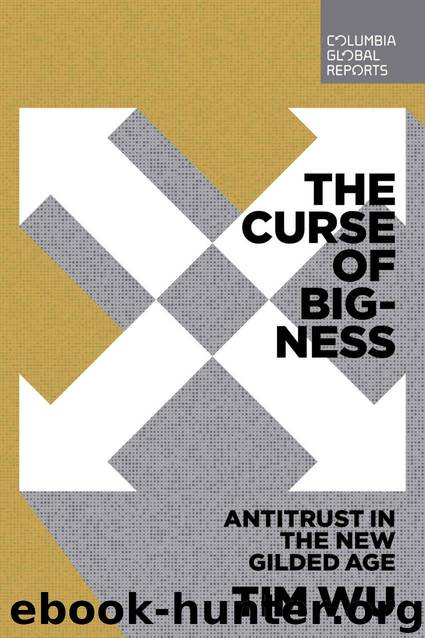The Curse of Bigness: Antitrust in the New Gilded Age by Wu Tim

Author:Wu, Tim
Language: eng
Format: epub
Publisher: Columbia Global Reports
Published: 2018-11-12T16:00:00+00:00
*The National Recovery Act of 1933 allowed industries to submit their own codes of competition, and offered an exemption from the antitrust laws in exchange.
†The law also received a boost from the famous Alcoa decision, a condemnation of the persistent aluminum monopoly written by judge Learned Hand. In Alcoa, Hand articulated a better repudiation of monopoly than Brandeis himself had ever managed, writing that a “possession of unchallenged economic power deadens initiative, discourages thrift, and depresses energy; that immunity from competition is a narcotic, and rivalry is a stimulant, to industrial progress; that the spur of constant stress is necessary to counteract an inevitable disposition to let well enough alone.” Congress, said Hand, had chosen to “prefer a system of small producers, each dependent for his success upon his own skill and character, to one in which the great mass of those engaged must accept the direction of a few.”
*American war efforts had also been hindered by a series of international cartel agreements in areas like synthetic rubber and aluminum that became essential to the buildup of American forces. There had been, as the New Republic alleged, “a Corporate International, joining the Communist International and Fascist International, seeking to undermine the free world.” The cartels were alleged to be part of Germany’s plan for world domination. German-run international cartels, the theory went, limited production while Germany prepared for war, part of an alleged “Peace at Düsseldorf.”
*In contrast, efforts to transplant U.S. antitrust laws to Japan during the same period were not particularly successful. The U.S. occupation authority forced passage of an antitrust law, and created an agency to enforce it, but the law was overshadowed by the economic planning practiced by other agencies. See Etsuko Kameoka, Competition Law and Policy in Japan and The EU (2014), pp. 5–6
*In the early 1960s, historian Richard Hofstadter would famously remark that antitrust was no longer a popular movement but that it “now runs its quiet course without much public attention.”
*One prominent exception was the iconoclastic economist Joseph Schumpeter, who had championed the entrepreneur in his earlier years, but in his later years grew to admire the large monopolistic corporation and begun to see the lure of monopoly as a principal driver of innovation and “creative destruction.” Schumpeter, however, did not take seriously the problem of investment in barriers to entry, and particularly the power of government to insulate monopolies from creative destruction. See Tim Wu, The Master Switch (2010).
*In Bork’s words: “A value will be announced as pertinent with a confidence that is matched only by the mystery that shrouds its derivation. A very specific decision is then whelped from the value premise without benefit of midwifery by any visible minor premise.”
Download
This site does not store any files on its server. We only index and link to content provided by other sites. Please contact the content providers to delete copyright contents if any and email us, we'll remove relevant links or contents immediately.
The Social Psychology of Inequality by Unknown(2312)
The Plant Paradox by Dr. Steven R. Gundry M.D(2047)
The Writing on the Wall by Anselm Jappe(1760)
Working for Yourself by J.D. (Nolo) Stephen Fishman(1480)
Every Landlord's Legal Guide by Janet Portman & Stewart Marcia & Ralph Warner(1329)
The First 20 Hours: How to Learn Anything ... Fast by Kaufman Josh(1308)
ADHD on Trial by Michael Gordon(1242)
Decisive by Chip Heath(1202)
Drafting Contracts: How and Why Lawyers Do What They Do, Second Edition by Stark Tina L(1174)
Working for Yourself by Stephen Fishman J.D. (Nolo)(1141)
The Economist Aug 8th 2015 by The Economist(1124)
Restitution by Restitution(1116)
The Economist Aug 29th 2015 by The Economist(1099)
A Practical Guide to International Arbitration in London by Hilary Heilbron(1085)
The Lord of the Rings: The Fellowship of the Ring, the Two Towers, the Return of the King by J. R. R. Tolkien(1084)
Intellectual Property Strategy by John Palfrey(1083)
Collusion by Luke Harding(1046)
Persuasion by Owner(1017)
Chapter 1 by Owner(952)
